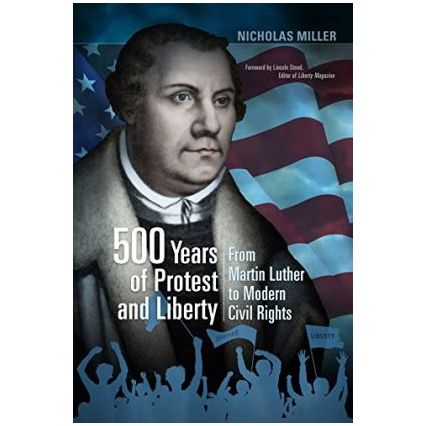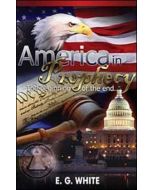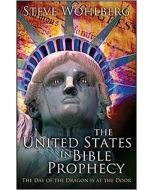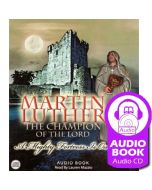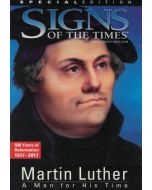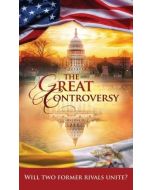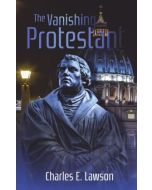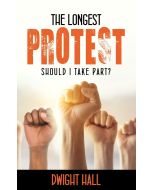500 Years of Protest and Liberty
From Martin Luther to modern civil rights
By Nicholas P. Miller
Paperback, 192 pages
Pacific Press, 2017
ISBN: 9780816363025
Qualifies for Free Shipping offer
Were Martin Luther s ideas the beginning of a larger movement for international human rights in the 20th century?
When Martin Luther King, Jr., marched on Selma, wrote a defense of civil disobedience from a Jail in Birmingham, and proclaimed his dream of racial equality on the steps of the Lincoln memorial, was he acting in the tradition of his namesake, the 16th century Protestant reformer Martin Luther?
Were their connections to the unfolding stream of Protestant history merely historical accidents?
Were they both just responding to the universal human resolve to stand for conviction and truth?
To ask the question more broadly, did the Protestant Reformation play any positive role in the development of human rights in the west?
The 500th anniversary of the publication of Martin Luther s 95 Theses in 1517 is a perfect time to reflect on these questions. 500 Years of Protest and Liberty traces a direct line from Martin Luther s powerful ideas about the equality of persons before God to more current debates about equal opportunity and the fundamental rights of humanity. Along the way, it asks tough questions about where the protestant church is headed today. Most important, 500 Years of Protest and Liberty is a reminder that Martin Luther s powerful ideas, which shaped our thinking as Christians today, call us back to the fundamental principles of our Christianity.
- Overview: From Martin Luther to Martin Luther King Jr.—Five Centuries of Protestant Pursuit of Liberty
Part I: European Backgrounds of Protestant Liberty, Rights, and Democracy
- Chapter 1: The Scripturally Informed Conscience: Luther and Religious Liberty, Part 1
- Chapter 2: The Revolutionary: Luther and Religious Liberty, Part 2
- Chapter 3: The Backgrounds of America’s Founding Protestant Philosophy
- Chapter 4: Luther, Locke, and Competing Notions of Human Dignity
- Chapter 5: Protestant Dignity and the Rise of Worldwide Democracy and Human Rights
Part II: Early American Experiences of Protestant Liberty
- Chapter 6: A Populist Religious Movement—How Did Church and State Separate in America?
- Chapter 7: What Kind of Liberty? The Civil War American Freedoms
- Chapter 8: After the Civil War: Bringing Freedom to the States
- Chapter 9: WallBuilders v. MythBuilders—David Barton and the Revising of America’s Past
Part III: Protesting Protestantism: Twentieth-Century Challenges to Religious Freedom
- Chapter 10: Religious Freedom and Modern American Politics
- Chapter 11: The Religious Right’s Assault on the Rights of Religion
- Chapter 12: Reconstruction—Rebuilding Religious Freedom
- Chapter 13: Rethinking Prisoner RFRA Exemptions
- Chapter 14: A Secular Threat to Religious Freedom
- Chapter 15: Cults in the Crossfire
- Chapter 16: Cults and Psycho Groups
- Chapter 17: Freedom Under Fire: The First Amendment in Times of Crisis
Part IV: Other Modern Legal Issues in Church and State
- Chapter 18: Homeschooling and the Law
- Chapter 19: The Price of Faith
- Chapter 20: Comments on Tuition Vouchers: Zelman v. Simmons-Harris
- Chapter 21: Tax-Tutored Theologians
- Chapter 22: Town of Greece v. Galloway—the “Christianization” of Local Government?
- Chapter 23: Is Religion a Hobby?
- Chapter 24: Religion Is Not a Hobby!
- Chapter 25: Religious Freedom: The New Bigotry?
- Chapter 26: Gay Marriage and the Supreme Court: What’s at Stake for Religious Freedom?
Conclusion: From Martin Luther to Donald Trump? Protestantism, Twenty-First-Century Populism, and the Future of Religious Liberty
Share your thoughts with other customers
Write review Contact
Contact![Adventist Book Centre Australia [with ABC Christian Books, Better Books and Food and Christian Life Resources] Adventist Book Centre Australia [with ABC Christian Books, Better Books and Food and Christian Life Resources]](https://adventistbookcentrecomau002.stagingwebsite.au/media/logo/stores/1/Adventist-Book-Centre-Australia-Logo.jpg)
